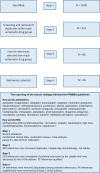2023 updated MASCC/ESMO consensus recommendations: prevention of nausea and vomiting following high-emetic-risk antineoplastic agents
- PMID: 38127246
- PMCID: PMC10739516
- DOI: 10.1007/s00520-023-08221-4
2023 updated MASCC/ESMO consensus recommendations: prevention of nausea and vomiting following high-emetic-risk antineoplastic agents
Abstract
Purpose: This systematic review updates the MASCC/ESMO recommendations for high-emetic-risk chemotherapy (HEC) published in 2016-2017. HEC still includes cisplatin, carmustine, dacarbazine, mechlorethamine, streptozocin, and cyclophosphamide in doses of > 1500 mg/m2 and the combination of cyclophosphamide and an anthracycline (AC) in women with breast cancer.
Methods: A systematic review report following the PRISMA guidelines of the literature from January 1, 2015, until February 1, 2023, was performed. PubMed (Ovid), Scopus (Google), and the Cochrane Database of Systematic Reviews were searched. The literature search was limited to randomized controlled trials, systematic reviews, and meta-analyses.
Results: Forty-six new references were determined to be relevant. The main topics identified were (1) steroid-sparing regimens, (2) olanzapine-containing regimens, and (3) other issues such as comparisons of antiemetics of the same drug class, intravenous NK1 receptor antagonists, and potentially new antiemetics. Five updated recommendations are presented.
Conclusion: There is no need to prescribe steroids (dexamethasone) beyond day 1 after AC HEC, whereas a 4-day regimen is recommended in non-AC HEC. Olanzapine is now recommended as a fixed part of a four-drug prophylactic antiemetic regimen in both non-AC and AC HEC. No major differences between 5-HT3 receptor antagonists or between NK1 receptor antagonists were identified. No new antiemetic agents qualified for inclusion in the updated recommendations.
Keywords: Antiemetics; Guideline; HEC; High-emetic-risk chemotherapy; Nausea; Vomiting.
© 2023. The Author(s).
Conflict of interest statement
Jørn Herrstedt (JH) declares that he has received honoraria from PharmaThen S.A.
Luigi Celio (LC) has received consulting fees Italfarmaco; speaker’s fee Berlin-Chemie AG.
Paul J Hesketh (PJH) declares that he has no financial interests.
Li Zhang (LZ) declares that he has no financial interests.
Rudolph M Navari (RMN) declares that he has no financial interests.
Alexandre Chan (AC) declares that he has no financial interests.
Mitsue Saito (MS) declares that she has no financial interests.
Ronald Chow (RC) declares that he has no financial interests.
Matti Aapro (MA) declares the following interests relevant to this manuscript: has received honoraria from Berlin-Chemie, Fosun, Helsinn Healthcare SA, Juniper Biologics, Knight Therapeutics, Mundipharma International Limited, Vifor Pharma.
Figures
Similar articles
-
2016 Updated MASCC/ESMO Consensus Recommendations: Prevention of Nausea and Vomiting Following High Emetic Risk Chemotherapy.Support Care Cancer. 2017 Jan;25(1):277-288. doi: 10.1007/s00520-016-3313-0. Epub 2016 Jul 22. Support Care Cancer. 2017. PMID: 27443154
-
MASCC antiemetic consensus recommendations: resource-limited settings.Support Care Cancer. 2025 Feb 12;33(3):181. doi: 10.1007/s00520-025-09211-4. Support Care Cancer. 2025. PMID: 39937269
-
Practice Patterns for Prevention of Chemotherapy-Induced Nausea and Vomiting and Antiemetic Guideline Adherence Based on Real-World Prescribing Data.Oncologist. 2021 Jun;26(6):e1073-e1082. doi: 10.1002/onco.13716. Epub 2021 Mar 17. Oncologist. 2021. PMID: 33555084 Free PMC article.
-
2023 updated MASCC/ESMO Consensus recommendations: Prevention of nausea and vomiting following moderately emetic risk antineoplastic agents.Support Care Cancer. 2023 Dec 20;32(1):45. doi: 10.1007/s00520-023-08222-3. Support Care Cancer. 2023. PMID: 38114821
-
Prevention of chemotherapy-induced nausea and vomiting in the real-world setting in Spain.Clin Transl Oncol. 2021 Oct;23(10):2155-2162. doi: 10.1007/s12094-021-02623-8. Epub 2021 May 6. Clin Transl Oncol. 2021. PMID: 33956310 Free PMC article.
Cited by
-
Characteristics of nausea and its impact on health-related quality of life in cisplatin-treated patients receiving dexamethasone-sparing prophylaxis: an analysis of the LUNG-NEPA study.Support Care Cancer. 2024 Mar 4;32(3):204. doi: 10.1007/s00520-024-08406-5. Support Care Cancer. 2024. PMID: 38433125
-
Multi-day vs single-day dexamethasone for the prophylaxis of chemotherapy-induced nausea and vomiting: systematic review and meta-analysis.Support Care Cancer. 2024 Oct 21;32(11):736. doi: 10.1007/s00520-024-08934-0. Support Care Cancer. 2024. PMID: 39432169
-
Relationship between nausea and vomiting and physical activity in patients with lung cancer undergoing first chemotherapy.Front Oncol. 2024 Jul 24;14:1396637. doi: 10.3389/fonc.2024.1396637. eCollection 2024. Front Oncol. 2024. PMID: 39114312 Free PMC article.
-
Dexamethasone-sparing strategies in anthracycline and cyclophosphamide-based chemotherapy with a focus on 5-HT3 receptor antagonists: a network meta-analysis.Front Oncol. 2024 Jul 26;14:1414037. doi: 10.3389/fonc.2024.1414037. eCollection 2024. Front Oncol. 2024. PMID: 39132500 Free PMC article.
-
NEPA (Netupitant/Palonosetron) for the Prevention of Chemotherapy-Induced Nausea and Vomiting (CINV) in Patients Receiving Highly or Moderately Emetogenic Chemotherapy Who Experienced Breakthrough CINV in Cycle 1 of Chemotherapy: A Phase II Clinical Trial.Cancer Med. 2025 Apr;14(7):e70549. doi: 10.1002/cam4.70549. Cancer Med. 2025. PMID: 40145359 Free PMC article. Clinical Trial.
References
-
- RRoila F, Molassiotis A, Herrstedt J, Aapro M, Gralla RJ, Bruera E, Clark-Snow RA, Dupuis LL, Einhorn LH, Feyer P, Hesketh PJ, Jordan K, Olver I, Rapoport BL, Roscoe J, Ruhlmann CH, Walsh D, Warr D, van der Wetering M on behalf of the participants of the MASCC/ ESMO Consensus Conference Copenhagen 2016 MASCC/ESMO guideline update for the prevention of chemotherapy- and radiotherapy-induced nausea and vomiting and of nausea and vomiting in advanced cancer patients. Ann Oncol. 2015;27(Supplement 5):v119–v133. doi: 10.1093/annonc/mdw270. - DOI - PubMed
-
- Cao J, Ouyang Q, Wang S, Ragaz J, Wang X, Teng Y, Wang B, Wang Z, Zhang J, Wang L, Wu J, Shao Z, Hu X. Mirtazapine, a dopamine receptor inhibitor, as secondary prophylactic for delayed nausea and vomiting following highly emetogenic chemotherapy; an open label, randomized, multicenter phase III trial. Invest New Drugs. 2020;38:507–514. doi: 10.1007/s10637-020-00903-8. - DOI - PubMed


